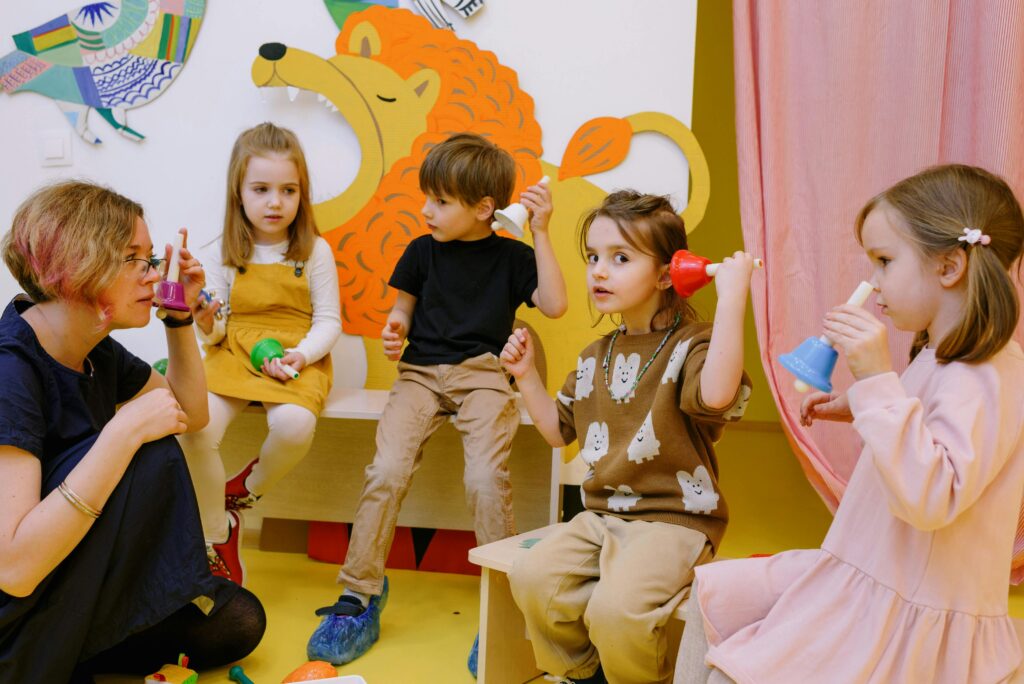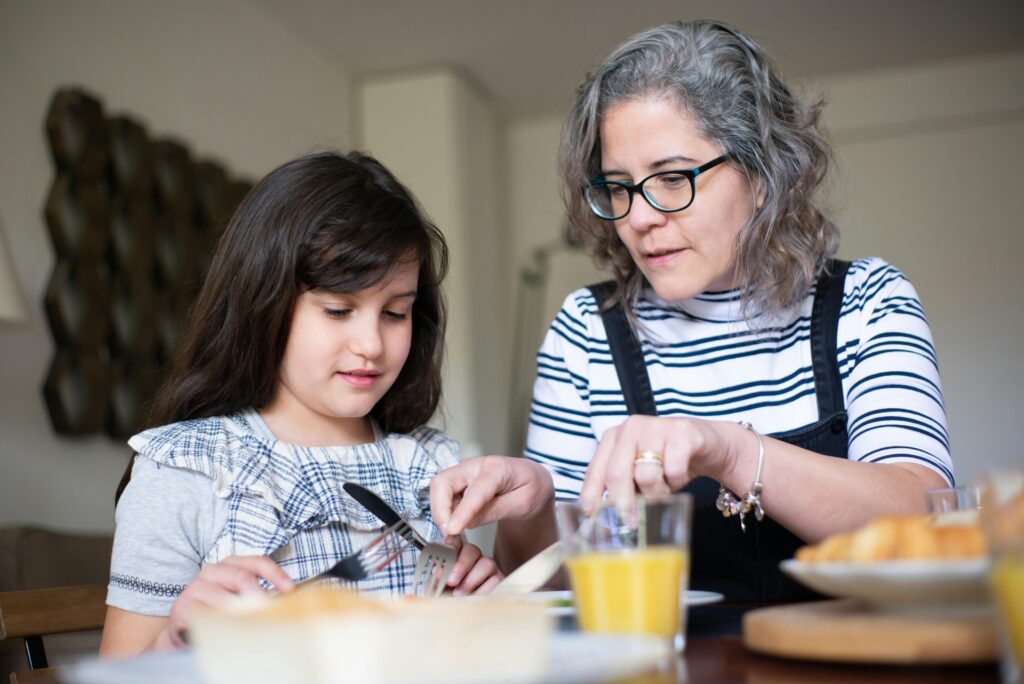The other day, my daughter, 5, held the door open for an elderly man at the grocery store. You could tell he was charmed. He patted her head and said, ‘You’re such a lady.’
I beamed and couldn’t help but think, This small act just made two people’s day. That’s what good manners, especially in kids, do. It has a massive ripple effect.
Here are some important manners you should instill in your kids.
1. Use Polite Words
Teach your kids the magic words of please, thank you, excuse me, and sorry. But they won’t magically pick these up just because you told them once. They learn them because they hear them often and see them in action.
Whenever I say ‘Thank you’ to the waiter, I want my daughter to hear it too. And I always make sure she says ‘Please’ before getting that extra cookie.
With time, these words will stop being “something Mom and Dad told me to say” and become a natural part of her language.
2. Greet People
It’s my duty to explain to my child how greetings work. In the morning, she’s got to wave to the neighbor and say ‘good morning’ to the bus driver.
She’s not always in the mood to talk, especially in the morning when she’s half-asleep or glued to the TV. That’s okay.
The goal isn’t to force a robotic conversation but help her see greetings as an act of politeness.
3. Mind Your Language
Kids will ignore you when you tell them to do their homework, but let one “grown-up word” slip, and suddenly they’ve memorized it with perfect pronunciation.
That is why teaching them to mind their language is more of us minding ours. You can’t expect a kid to filter their words if we don’t filter ours. They will always notice the little things: when you are short with the cab driver or mutter at the cashier.
Model a calm and respectful speech even when annoyed, and have them copy that.
4. Patience
Patience doesn’t come naturally to kids. Not when queueing or waiting for their turn on the swing. In their world, now is the only time that matters.
A trick I’ve learnt over the years is to start small. A four-year-old will complain when made to wait for an hour. But you can help them wait a minute without melting down.
When the wait becomes long, engage them in a fun activity like a fun song to make the wait more bearable for them.
5. Listen Without Interrupting

It doesn’t matter if an idea pops into their head, but they can’t blurt it out while someone else is talking. Kids need to understand that everyone needs a fair chance to talk. Unless, of course, it’s an emergency like when they need to poop. Then they can blurt it out.
6. Sharing is Caring
Like waiting, sharing isn’t a life skill kids are born with. They’ll easily fight over a toy that doesn’t belong to them. Reward your kid for splitting a cookie with a sibling or sharing their crayons with a friend.
But also remember, sharing doesn’t always mean they have to give up their belongings on demand. Help them understand that it’s okay to say, “You can use it after I’m done.”
7. No Commenting on People’s Appearance
Children are naturally curious and brutally honest. They’ll say aloud only what should be thought: ‘Her breath smells’ or ‘Why is his tummy so big?’
Of course, they mean no harm. But such comments are impolite and can sting. That’s why the onus is on you as a parent to let them know it’s not okay to give opinions on people’s looks, especially negative ones.
If it happens in the moment, don’t scold them. Take them aside later and explain what they did was wrong and why.
Flip the narrative and ask them how they’ll feel if someone points out their messy hair in front of others. Frame it in love and kindness, and it will likely stick faster than a lecture.
8. Table Manners

We all expect kids to be messy at the table. But knowing the basic table manners will make meal times calmer and much more pleasant for everyone involved.
Start with the basics: sit down to eat and don’t wander off mid-bites. Chew with your mouth closed and don’t talk with food in your mouth. Don’t reach for items at the table and instead, politely ask for them to be passed.
Accidents will occasionally happen, and that’s fine. A spilled cup isn’t the end of the world. What matters is how they handle it. A quick apology and an attempt to clean it up should suffice.
9. Clean Up After Yourself
Picking up my kid’s Legos and putting them away can be tiresome, and occasionally irritating when I step on them. Now, as part of routine, she has to clean up after herself. All the bricks need to be back in their box before starting something new.
When she spills a drink, I’ll hand her a cloth and let her wipe it up. However tempting it is to do it myself (because I’m tired and it’s faster), I resist. This way, she learns that her mess is for her to clean up.
Also Read: The Essential Guide to Coffee Shop Etiquette
10. Ask Permission
Children have a curiosity to grab and try things without hesitation. This curiosity is excellent for learning, but may need a little steering.
Let them know that not everything is automatically theirs to touch, and they need to ask permission before taking them.
Like most manners, this one sticks best when you model it. Ask them, “Can I borrow your eraser?” even when you obviously could. It teaches them that asking for permission is a sign of etiquette.
11. Respect Other People’s Belongings
Ownership matters, and kids need to understand this. This way, they don’t show up with a ‘found’ neighbor’s ball. They need to ask before using other people’s belongings.
And when granted, they should also handle them with care. A borrowed friend’s book shouldn’t be returned with crayon doodles all over.
12. Knock Before Entering a Room
If a door is closed, your child should know to knock before entering. This is a lesson that will save them (and you) from many future awkward moments.
Make it second nature. A simple knock and then wait for a ‘come in.’ If they don’t receive an answer, then it’s a no-go.
This should work both ways. Knock before entering their room, also. It teaches them that privacy isn’t an adult-only privilege.
13. Apologize When Wrong
Kids (and some adults) may find saying sorry difficult since they see it as an admission of defeat. But learning to apologize when wrong is one important skill they’ll carry into adulthood.
When teaching your young ones to apologize, make sure they don’t rush or mumble it. It should be real, where they look the other person in the eye and mean it.
It will be even more helpful if they can follow it up with action, like helping fix what they broke or doing something kind in return.
14. Avoid Hurtful Words or Teasing
It’s not okay to tease others. It’s not okay to call names and be mean to other kids. Let your kids know that when they do so, they hurt their friends’ feelings. A good friend laughs with their friend and not at them.
And when they do so mistakenly, they need to apologize.
15. Express Gratitude
Kids should appreciate the good things that happen to them. Let them thank the bus driver and say thank you when someone passes the salt.
As part of family culture, ask everyone at dinner to share one thing they were grateful for that day. It doesn’t have to be big and could be as simple as ‘I shared my snack with a friend.’
Gratitude becomes easier to express when it’s practiced daily.
Time and Patience
There’s so much more to teach your kids, like helping out when needed and being kind to animals. But it’s all about one lesson at a time.
Most of these teachings take time and plenty of patience. But every lesson, however small, will help shape them to become better and responsible adults.
Featured image from Pexels.








